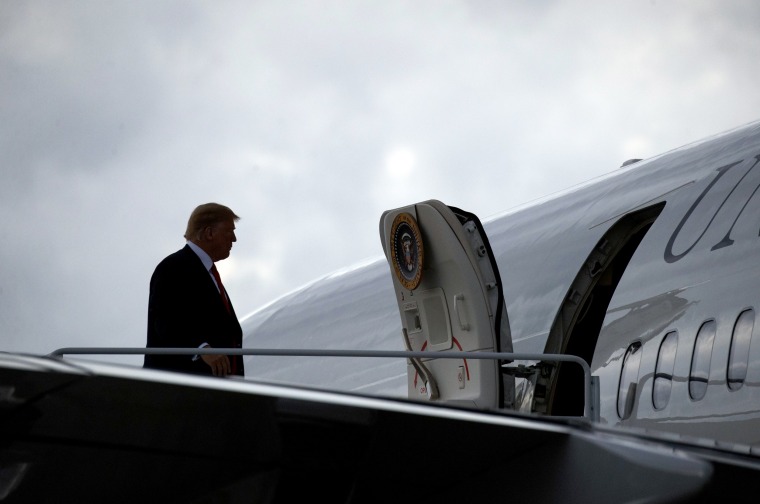PARIS — President Donald Trump is headed to France, bruised yet emboldened by an election at home and set to face many world leaders pushing a global view squarely at odds with his "America First" vision.
Looming over Trump’s weekend in Paris, where dozens of heads of state will commemorate the 100th anniversary of the end of World War I and call for more international engagement, is the prospect of an impromptu pull-aside discussion with Russian President Vladimir Putin.
A formal meeting between Trump and Putin was pushed back until later this month when they’re both in Argentina for a global summit. But it’s possible a substantive discussion could take place here as the two men have held lengthy informal exchanges on the sidelines of other international gatherings.
The potential encounter between Trump and Putin comes as special counsel Robert Mueller’s investigation into Russia’s interference in the 2016 election is expected to publicly ramp up after a quiet couple of months during the midterm campaigns. And Trump is expecting an onslaught of congressional oversight investigations from Democrats after he’s back home.
On Thursday the Trump administration took steps likely to anger Russia and please European leaders by adopting new sanctions in response Moscow’s continued "destabilizing" activity in Crimea.
Trump’s Paris visit is a consolation trip of sorts. He initially directed the Pentagon to organize a U.S. military parade in Washington to mark Veterans Day, but those plans were scuttled when the price tag came in at more than $90 million.
Instead Trump said he would accept French President Emmanuel Macron’s invitation to attend this weekend’s events in Paris. And while the president had called the celebration of Armistice Day a "parade," it’s actually a series of events, including a dinner Saturday night and a ceremony on Sunday at the foot of the Arc de Triomphe.
As he left the White House for the trip Friday morning, Trump told reporters he is looking forward to the weekend’s events. “The leadership of many countries will be there,” he said. “It will be a great commemorative service. I think it's going to be something very special.”
The pageantry will include a speech by Macron next to the Tomb of the Unknown Soldier and a performance by cellist Yo-Yo Ma.
Trump, who will be joined by first lady Melania Trump, will also visit Aisne-Marne American Cemetery in Northern France. His only expected formal remarks are Sunday at Suresnes American Cemetery. Trump is only the third sitting U.S. president to visit the cemetery, which is a World War I and World War II memorial.
"This is a historic opportunity to honor the sacrifices of those who gave their lives for our freedom in that struggle," said a senior administration official briefing reporters on the trip. "The president's participation in these events will also serve as the reminder of the important role that the United States has played and continues to play in ensuring peace and security in Europe."
The official specifically mentioned the weekend’s events being an opportunity for Trump to highlight the importance of deterring the use of chemical weapons in conflicts today.
Trump’s only scheduled meeting with a world leader is on Saturday with Macron.
His other counterparts in Paris, however, will be paying close attention during his first appearance outside of the U.S. since Democrats won control of the House and his own Republican Party held the Senate.
For them, Tuesday’s election was the first indicator of whether Trump is likely to be a one-term president or will have the staying power that could generate a long-term shift in American foreign policy. While some European leaders, such as the new prime minister of Italy, Giuseppe Conte, have embraced Trump, others have been roiled by his criticism of trade pacts and longtime U.S. alliances on the continent.
Erik Brattberg, director of the Europe program at Carnegie Endowment for International Peace, said European leaders who read the elections as “a mixed picture” are intensifying their debate over whether Europe should reconsider its relationship with the U.S. on foreign policy and defense issues.
"It is clear that he will now have a little bit more of a check in terms of the Democrats controlling the House," Brattberg said of Trump. "At the same time, it’s not the sort of widespread repudiation that some European leaders were hoping for. European leaders are realizing that he’s still a very formidable player in U.S. politics and that it’s very possible he’ll be around for another six years."
The tradition of a presidential trip abroad in the days after a midterm election can be the welcome reprieve from political headwinds at home and a chance to advance foreign policy initiatives. But for Trump, who has claimed Tuesday’s midterm results as a victory, it’s unlikely to be either. Substantive discussions about trade, climate change or strained U.S.-Russia relations are not expected to take place. And Trump’s world view is unlikely to get a warm embrace.
Heather Conley, director of the Europe program at the Center for Strategic and International Studies, said the backdrop Macron tried to create for the commemoration in Paris this weekend is "that this need for greater international engagement to solve international problems is key."
"The question is whether the president will use this moment to emphasize his points — that he believes nationalism is at the heart of solving problems for the United States," she said, or if other leaders’ points of view will prevail.


